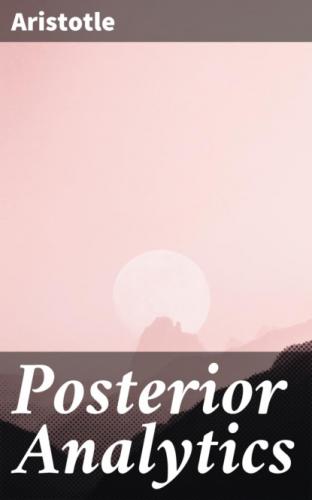Chapter VII: Whether the Essence can in any way be proved
Chapter VIII: How the Essence can be proved
Chapter IX: What Essences can and what cannot be proved
Chapter X: The nature and forms of Definition
Chapter XI: The kinds of Causes used in Demonstration
Chapter XII: On the Causes of events which exist, are in process, have happened, or will happen
Chapter XIII: On the search for a Definition
Chapter XIV: On the discovery of Questions for Demonstration
Chapter XV: How far the same Middle Term is employed for demonstrating different Questions
Chapter XVI: On inferring the Cause from the Effect
Chapter XVII: Whether there can be several causes of the same thing
Chapter XVIII: Which is the prior cause, that which is nearer the particular, or the more universal?
Chapter XIX: On the attainment of Primary Principles
Book I.
Chap. I.: Whether a Demonstrative Science exists
Chap. II.: What Knowing is, what Demonstration is, and of what it consists
Chap. III.: A refutation of the error into which some have fallen concerning Science and Demonstration
Chap. IV.: The meaning of ‘Distributive,’ ‘Essential,’ ‘Universal’
Chap. V.: From what causes mistakes arise with regard to the discovery of the Universal. How they may be avoided
Chap. VI.: Demonstration is founded on Necessary and Essential Principles
Chap. VII.: The Premises and the Conclusion of a Demonstration must belong to the same genus
Chap. VIII.: Demonstration is concerned only with what is eternal
Chap. IX.: Demonstration is founded not on general, but on special and indemonstrable principles; nor is it easy to know whether one really possesses knowledge drawn from these principles
Chap. X.: The Definition and Division of Principles
Chap. XI.: On certain Principles which are common to all Sciences
Chap. XII.: On Questions, and, in passing, on the way in which Sciences are extended
Chap. XIII.: The difference between the Demonstration and Science of a thing’s Nature and those of its Cause
Chap. XIV.: The figure proper to Demonstrate Syllogism
Chap. XV.: On immediate negative propositions
Chap. XVI.: On ignorance resulting from a defective arrangement of terms in mediate propositions
Chap. XVII.: On ignorance resulting from a defective arrangement of terms in immediate propositions
Chap. XVIII.: On ignorance as resulting from defective sense perception
Chap. XIX.: Whether the Principles of Demonstration are finite or infinite
Chap. XX.: Middle terms are not infinite
Chap. XXI.: In Negations some final and ultimate point is reached where the series must cease
Chap. XXII.: In Affirmations some final and ultimate point is reached where the series must cease
Chap. XXIII.: Certain Corollaries
Chap. XXIV.: Whether Universal or Particular Demonstration is superior
Chap. XXV.: That Affirmative is superior to Negative Demonstration
Chap. XXVI.: Direct Demonstration is superior to Reduction per impossible
Chap. XXVII.: What science is more certain and prior, and what less certain and inferior
Chap. XXVIII.: What constitutes one or many Sciences
Chap. XXIX.: Concerning many Demonstrations of the same thing
Chap. XXX.: On fortuitous occurrences
Chap. XXXI.: Sense perception cannot give Demonstrative Science
